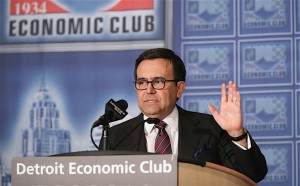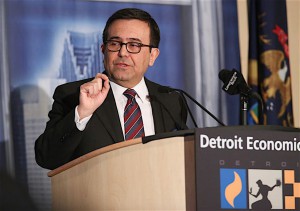
Mexico's top trade official Ildefonso Guajardo told the Detroit Economic Club that any renegotiation of NAFTA must benefit all the parties.
The North American Free Trade Agreement should be revised, but only if all three signatories to the treaty benefit, Mexico’s top trade negotiator said in a speech in Detroit.
Mexico’s Secretary of Economy, Ildefonso Guajardo, told the Detroit Economic Club that NAFTA is 23 years old and said revisions could benefit Canada and Mexico as well as the U.S. However, he rejected the notion that the revisions should only help the U.S. as President Donald Trump has repeatedly suggested in comments on NAFTA.
“It is not very wise to sit down with the skewed view there has been only one winner. We were all winners,” he said.
“At the end of day there are many things that can improve NAFTA,” Guajardo said during his appearance in Detroit, which has been central to Trump’s discussion of NAFTA. Trump has said the expansion of the Mexican auto industry had drained away jobs from the U.S.
In order to get the final agreement to a safe landing, the revisions must represent a win, win, win agreement for all three nations, Guajardo said.
“There is no way I can go back to Mexico with an agreement that does not represent an advancement in Mexican interests. That is just a reality politically,” Guajardo said.

Guajardo told a crowd in Detroit that he would not redo NAFTA if it didn't benefit Mexico in some way.
NAFTA has helped transform the Mexican economy and Mexican politics by opening the system up to competing interest and parties, added Guajardo.
(MEMA against Trump border tax plan. Click Here for the story.)
“Mexico is not the same closed economy that it was in the 1960s and 1970s,” he said. “I do believe that NAFTA has been a great success,” he added, benefitting people on both sides of the U.S.-Mexican border.
But the transformation is incomplete and revising NAFTA by encouraging greater competition in the telecommunication and financial sectors could yield major benefits for Mexico and for Mexican consumers. “We think this can be a very positive engagement,” said Guajardo, who expects to meet with U.S. Secretary of Commerce in Washington D.C. next week.
Guajardo said he move to impose U.S. tariffs on goods made in Mexico would scuttle revisions to NAFTA.
The Trump administration must still notify the U.S. Congress that it is re-opening talks on NAFTA but talks can’t begin for 90 days after than under American law. Nevertheless, Guajardo said he hoped negotiations could begin the middle of June.
Guajardo also cautioned that opening up of the Mexican economy to the forces of globalization has created contending power centers in Mexican politics. Any NAFTA revisions will need support across the political spectrum since the government no longer has the power to impose changes without consensus.
Mexico negotiators are open to changes that should appeal to the U.S. bargaining team such as greater protection intellectual property that originates in the U.S. and also e-commerce, an area where the United States has a clear edge.
“The U.S. is a leader in medical devices and we agree that patents and protection of intellectual property in this area should be extended,” he said
Guajardo was in Detroit to visit with executives from both General Motors and the Ford Motor Co., which have been under pressure from the Trump administration to move jobs from plants in Mexico back to the U.S.
(Click Here for more about Mexico warning Trump about tariff talk.)
Neither GM nor Ford had any comment on the meetings but Guajardo noted in his speech to a group of business leaders and students that Detroit and Michigan have been major beneficiaries of NAFTA. Job losses attributed to NAFTA can actually be traced back to the rising use of automation in factory processes that have changed “the 20th century way of life.”
Guajardo, however, noted that a study of jobs disappearing from the U.S. “Rust Belt” found that 87% vanished due to technological changes. “The challenges are not that 700 jobs moved from Indiana to San Luis Potosi. The challenge is much greater,” he said.
“Trade policy is great but it will not solve the policies we have domestically,” he added, noting that each nation must also address its issues such as job creation, education and competition through its own political system.
Mexico is also a much more valuable trade partner than standard trade statistics suggest, he said. Mexico now runs a $60 billion trade surplus with the U.S. but the actual figure is smaller because of the U.S. runs a trade surplus in services, which are not counted in trade figures.
In addition, Mexicans also spend billions of dollars in U.S. border cities such as Miami, Houston and San Antonio, Texas further reducing the nominal trade deficit to a far smaller figure, Guajardo said.
(Trump threatens Canada, Mexico, with new border tariffs. Click Here for the story.)
“The U.S. is sovereign nation. It has the right to build a wall on its side of the border. That has nothing to do with trade relations,” he said. The U.S. will have to have efficient border crossings so “legal” traffic can continue.
